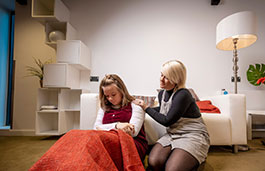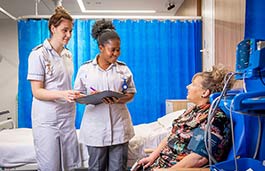Search
Occupational Therapy BSc (Hons)
Study level: UndergraduateProfessionally Accredited Programmes
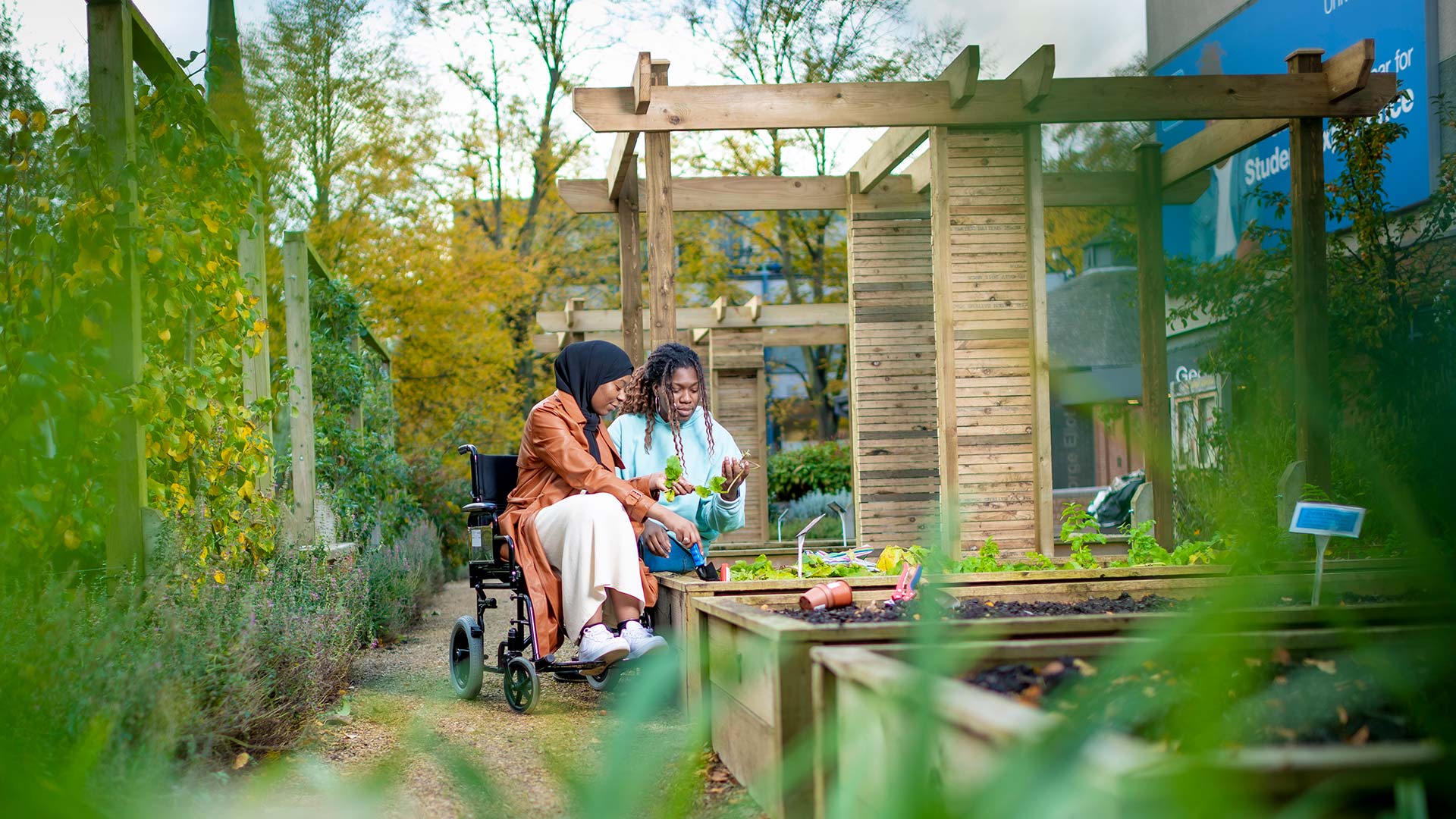
Occupational therapists have the privilege of working with people of all ages, helping them to participate in occupations that hold personal meaning and value to them.
Course features
Course option
Year of entry
2026-27
Location
Coventry University (Coventry)
Study mode
Full-time
Duration
3 years full-time
UCAS codes
HU09
Start date
September 2026
Course overview
Occupational therapists work with individuals, groups, communities or populations to promote health and wellbeing through participation in activities of everyday life, or occupation. Of vital importance to this role is the ability to think critically and creatively, challenge where needed, advocate and empower others to live their best lives. In addition to developing practice skills, this course is designed to help you develop the mindset needed for this life-changing career.
- Leads to eligibility to apply for professional registration as an occupational therapist with the Health and Care Professions Council (HCPC) and membership of the Royal College of Occupational Therapists (RCOT) and the World Federation of Occupational Therapists (WFOT) (please see Accreditation section for more information).
- Learn to empower and support others with challenges in key areas of occupation such as self-care (e.g. washing, dressing, or eating), restorative activity and productivity (e.g. managing finances, working or studying), as well as activities that develop social connections and provide a sense of purpose and fulfilment.
- Professional placements, sourced by the university, offer practice-based learning opportunities in traditional, contemporary and role-emerging settings (you’ll need to successfully complete a minimum of 1000 hours of supervised practice)2,5.
- Strong focus on cultural humility and anti-discriminatory practice.
- Focus on one academic module at a time, with five weeks of learning followed by one week of assessment per module.
- You’ll be encouraged to think critically about the potential of digitally enabled occupational therapy (e.g. use of AI and wearable technology) and the future direction of the profession.
- All eligible students on this course can apply for a minimum payment from the Government of £5,000 per year, with additional payments for students incurring childcare costs6.
Rated Gold Overall
Teaching Excellence Framework (TEF) 20235 QS Stars for Teaching and Facilities
QS Stars University RatingsTop 5 Student City in England (Coventry)
QS Best Student Cities Index 2026Why you should study this course
Becoming an occupational therapist enables you to work in partnership with other people. Your values, skills and mindset will all be key in addressing barriers that prevent people from engaging in activities that provide meaning and purpose, shape identity and enhance health and wellbeing.
- Our approach supports you to develop a strong sense of professional identity as an occupational therapist from the outset. In addition, you’ll have the opportunity to learn to thrive in dynamic health and care environments and multidisciplinary teams, developing your relationship and teamworking skills.
- Your practice placements can be in a range of settings2,5. These could include charities, businesses, sports and leisure facilities, independent practice, the private sector and community facilities.
- Colleagues with lived experience as users of health and care services support teaching, learning and assessment.
- The diversity of our learner community is a key strength of the course, offering a space in which everyone can thrive.
- We offer opportunities to learn in a safe but realistic practice environment through simulation in our industry-relevant facilities.
- Engagement with the global occupational therapy community to foster the delivery of sustainable and inclusive occupational therapy.
- Access to success coaches, placement supervisors and specialist support for mathematics and academic writing4.
Studying in the School of Health and Care
Gain the skills and experience to transform lives, communities and the future of healthcare delivery. We aim to empower you to become a stand-out healthcare professional, capable, competent and confident in your field and role within the wider healthcare team.
While continuously developing your sense of professional identity as an occupational therapist from day one, you'll also collaborate with learners from other School of Health and Care fields, learning in an environment that puts inclusivity, diversity and dignity at its heart.
Accreditation and professional recognition
This degree is accredited1 and recognised by the following bodies:

Health and Care Professions Council (HCPC)
The Occupational Therapy BSc (Hons) programme is approved by the Health and Care Professions Council (HCPC).
On successful completion of the programme, you will be eligible to apply for HCPC registration (subject to HCPC criteria and any additional costs. See the website for full details).1
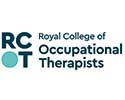
Royal College of Occupational Therapists
The BSc (Hons) Occupational Therapy programme is accredited by the Royal College of Occupational Therapists (RCOT).1
When enrolled on the course, you are eligible to become a student member of the Royal College of Occupational Therapists (subject to application and additional costs may apply).
For more information, please visit the RCOT website.
What you'll study
We regularly review our course content, to make it relevant and current for the benefit of our students. For these reasons, course modules may be updated.
How you'll learn
We understand that everyone learns differently, so this course will consist of structured teaching sessions which can include:
- lectures, seminars and workshops
- peer learning and group work
- experiential and reflective learning
- problem-based learning
- self-directed learning
- contextualised learning
- professional practice-based learning opportunities2,5.
Teaching contact hours
As a full-time undergraduate student, you will study modules totalling 120 credits each academic year. A typical 20-credit module requires a total of 200 hours study. This is made up of teaching contact hours, guided and independent study.
Teaching hours:
Teaching hours vary each semester, year of study and due to module selection. During your first year you can expect 15-18 teaching hours each week. You will also have the option to attend optional sessions including time with a progress coach or to meet with staff for advice and feedback. As you progress through your studies, teaching hours may reduce.
Practice-based learning:
Practice-based learning forms an essential and significant part of your learning experience. Practice hours will differ between placements and different health and care courses. You will have access to university staff, but should expect to spend the majority of your contact time with practice collaborators undertaking placement activity. Overall, the hours you undertake in practice-based learning will need to satisfy the eligibility requirements set by the professional body regulating the profession, the HCPC. No less than 1000 practice-based hours gained from a combination of placement and simulated learning will need to be completed over the course of your degree.
Guided and independent study:
Throughout your studies, you will be expected to spend time in guided and independent study to make up the required study hours per module. You’ll be digging deeper into topics, review what you’ve learned and complete assignments. This can be completed around your personal commitments. As you progress through your studies, you’ll spend more time in independent study.
Online learning:
As an innovative university, we use different teaching methods including online tools and emerging technologies. So, some of your teaching hours and assessments may be delivered online.
Assessment
This course will be assessed using a variety of methods which will vary depending upon the module.
Assessment methods may include:
- case study
- coursework
- practice placement2,5
- portfolio
- professional project
- presentations.
The Coventry University Group assessment strategy ensures that our courses are fairly assessed and allows us to monitor student progression towards achieving the intended learning outcomes.
Entry requirements
Typical entry requirements:
Not got the required grades? We offer this degree with an integrated foundation year.
Fees and funding
| Student | Full-time | Part-time |
|---|---|---|
| UK, Ireland*, Channel Islands or Isle of Man | 2026/27 fees TBC 2025/26 fees: £9,535 per year |
Not available |
| EU | 2026/27 fees TBC 2025/26 fees: £9,535 per year with EU Support Bursary** 2026/27 fees TBC 2025/26 fees: £19,850 per year without EU Support Bursary** |
Not available |
| International | 2026/27 fees TBC 2025/26 fees: £19,850 per year |
Not available |
A non-repayable grant of £5,000 and extra payments worth up to £3,000 may be available to eligible students for each year of study6. Read more about this in the NHS Learning Support Fund information booklet.
For advice and guidance on tuition fees and student loans visit our Undergraduate Finance page and see The University’s Tuition Fee and Refund Terms and Conditions.
The University will charge the tuition fees that are stated in the above table for the first Academic Year of study. The University will review tuition fees each year. For UK (home) students, if Parliament permits an increase in tuition fees, the university may increase fees for each subsequent year of study in line with any such changes. Note that any increase is expected to be in line with inflation.
For international students, we may increase fees each year, but such increases will be no more than 5% above inflation. If you defer your course start date or have to extend your studies beyond the normal duration of the course (e.g. to repeat a year or resit examinations) the University reserves the right to charge you fees at a higher rate and/or in accordance with any legislative changes during the additional period of study.
We offer a range of International scholarships to students all over the world. For more information, visit our International Scholarships page.
Tuition fees cover the cost of your teaching, assessments, facilities and support services. There may be additional costs not covered by this fee such as accommodation and living costs, recommended reading books, stationery, printing and re-assessments should you need them. Find out what's included in your tuition costs.
The following are additional costs not included in the tuition fees:
- Any optional overseas field trips or visits: £400+ per trip.
- Any costs associated with securing, attending or completing a placement (whether in the UK or abroad).
*Irish student fees
The rights of Irish residents to study in the UK are preserved under the Common Travel Area arrangement. If you are an Irish student and meet the residency criteria, you can study in England, pay the same level of tuition fees as English students and utilise the Tuition Fee Loan.
**EU Support Bursary
Following the UK's exit from the European Union, we are offering financial support to all eligible EU students who wish to study an undergraduate or a postgraduate degree with us full-time. This bursary will be used to offset the cost of your tuition fees to bring them in line with that of UK students. Students studying a degree with a foundation year with us are not eligible for the bursary.
Facilities
You'll have access to simulated learning environments including hospital wards, skills labs, and two fully equipped community houses4.
Facilities are subject to availability. Access to some facilities (including some teaching and learning spaces) may vary from those advertised and/or may have reduced availability or restrictions where the university is following public authority guidance, decisions or orders.
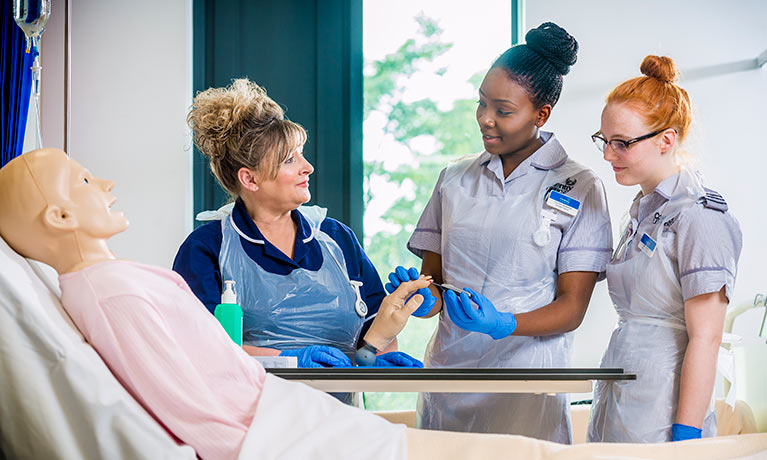
Hospital wards
We have two fully-equipped mock hospital wards, each containing four beds. The wards are built to NHS standards and contain moveable beds, first aid equipment and patient monitoring tools.

Alison Gingell Building
Get hands-on experience simulating real-life situations with our mock ambulance, community houses, operating theatre, scrub room and therapy suites.
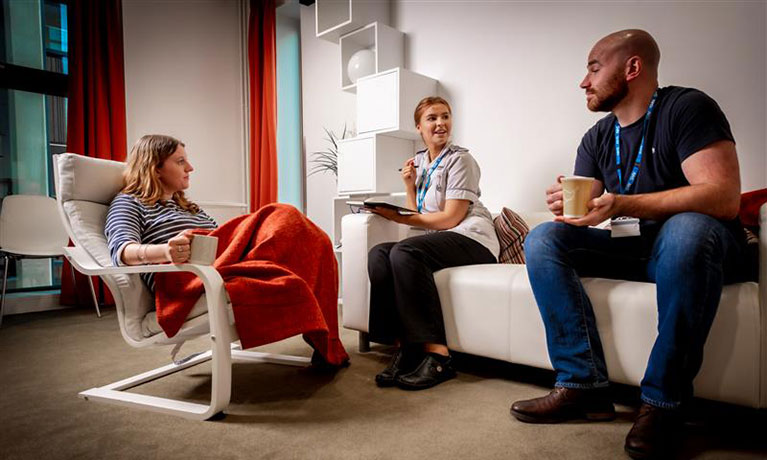
Community houses
Our two full-size community homes can be used for sessions simulating working with patients outside of a hospital setting.
Facilities are subject to availability. Access to some facilities (including some teaching and learning spaces) may vary from those advertised and/or may have reduced availability or restrictions where the university is following public authority guidance, decisions or orders.
Careers and opportunities
Coventry University is a well-established provider of education in occupational therapy and this course has been designed with a focus on employability. It aims to prepare you for a long and rewarding career in clinical and non-clinical settings such as acute hospital settings, community settings, public health, industry, social enterprise, independent practice, teaching and research.
Accreditation of the course by the Royal College of Occupational Therapists1 indicates recognition of qualification by the World Federation of Occupational Therapists. This opens up the opportunity to practice as an occupational therapist abroad (subject to meeting the registration requirements of the relevant country).
How to apply
You may also like
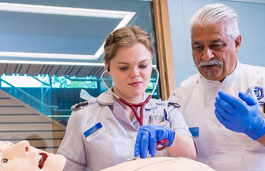
Adult Nursing (pre-registration) BSc (Hons)
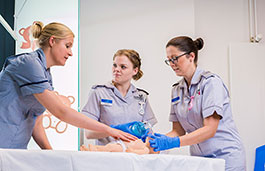
Children and Young People's Nursing BSc (Hons)
